9 min read
ALPS In Brief Podcast - Episode 10: Why is mandatory malpractice insurance gaining ground?
ALPS Executive Vice President, Chris Newbold, recently sat down with Doug Ende, the Chief Disciplinary Counsel at the Washington State Bar...
9 min read
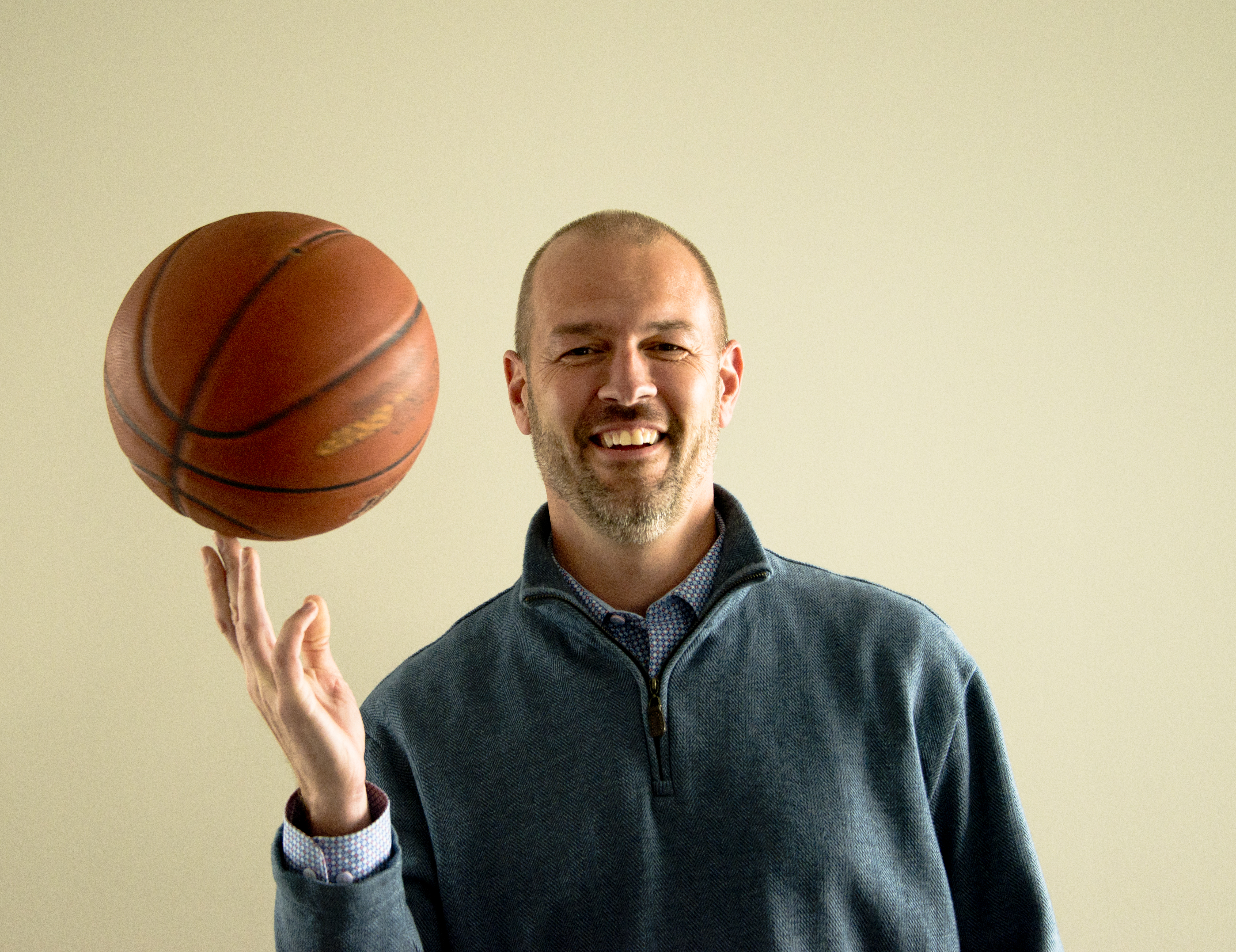 Chris Newbold, Chief Operating Officer
:
Updated on February 28, 2024 | Posted on December 6, 2018
Chris Newbold, Chief Operating Officer
:
Updated on February 28, 2024 | Posted on December 6, 2018
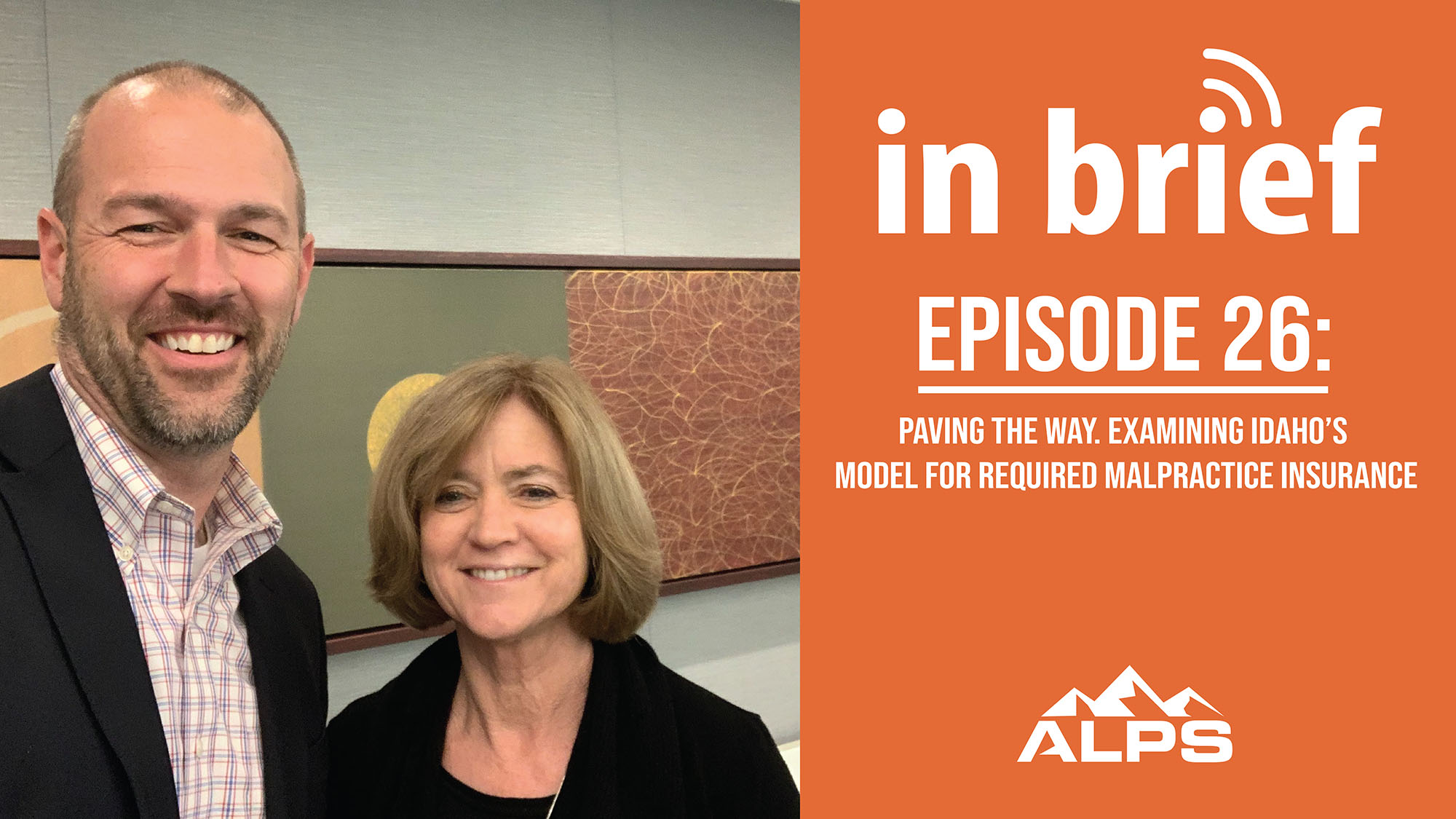
Last year, Idaho became the second state to require malpractice insurance for private practitioners — and the first to adopt an open-market model to serve their state bar members. How did year one go? ALPS Executive Vice President Chris Newbold checks in with Diane Minnich, Executive Director of the Idaho State Bar, to find out in this episode of ALPS In Brief Podcast.
Transcript:
CHRIS NEWBOLD:
Good afternoon and welcome to another edition of ALPS in Brief. My name is Chris Newbold, Executive Vice President of ALPS, standing in for Mark Bassingthwaighte, for a podcast around an issue that’s growing in importance particularly out West which is requiring lawyers to have malpractice insurance. Today I’m joined by Diane Minnich who’s the Executive Director of the Idaho State Bar. And Idaho recently became the second state in the country to require malpractice insurance for private practitioners as a condition of licensure. So, Diane, thanks for joining me today.
DIANNE MINNICH:
You’re welcome.
CHRIS:
So let’s just maybe talk about just kind of how the concept in Idaho got started. What was the mechanism that triggered the discussion and when did it take place?
DIANNE:
Any rule change that is proposed in Idaho has to be taken to the Idaho State Bar membership for a vote and so in this particular case our president at the time thought that requiring malpractice insurance of attorneys was the right thing to do. She had done some defense work and felt like sometimes the clients were not being served well by those lawyers who threatened to file bankruptcy if you filed a malpractice claim against them. So she submitted that issue to our membership in 2016 and we went to every … We go around the state, visit with all the lawyers. They all have an opportunity to vote. We talked with them. We had the people who were concerned and people who were supportive and it passed by the membership. Once that happened then we submit that proposal to the Supreme Court and they adopted it in 2017. In 2018 licensing, which is this year, was the first year that it was implemented for all lawyers that were representing private clients in Idaho.
CHRIS:
Okay. Now, the other state that requires malpractice insurance is Oregon and I think your model is a little bit different than the Oregon model. Talk to us about what model you adopted and why.
DIANNE:
The model we have is just basically open market, that every lawyer that represents private clients is required to obtain malpractice insurance in a 300 … 100, 300 are the limits. We looked at the Oregon model in the past and I think our population of lawyers is just not large enough to support that particular model and so we determined that to try it out in the … Let everybody try to find the insurance themselves and determine what they want to pay and who they want to go with, who they want as their carrier, was the best approach for us given our size.
CHRIS:
Okay, so you required it of your lawyers to go into the open market and was everybody who was required to get insurance, were they able to secure insurance?
DIANNE:
As far as we know everyone that was required under the rule to obtain insurance has done so. We had some that it took some time to do so. There were some concerns about cost and so some people said they couldn’t get it and the real issue was the cost. We’ve learned since then there have been a few lawyers who didn’t re-up their licensing because they didn’t have insurance and we’re going to encourage them to go ahead and do the licensing and then we’ll work with them on insurance. I think there was a group of lawyers who were on the verge of retirement who, having to obtain insurance at this point in their career, made a choice to not continue to practice. Most of those that made that choice were close to retirement anyway and it sort of was the thing that pushed them over that to make that final decision which is, “Okay, I’m getting ready to retire. Now I’m going to do so.”
CHRIS:
How many lawyers in Idaho are there and how many are kind of required to abide by the new rule?
DIANNE:
Our total membership is about 6,500. The active members is 4,000 and I think we determined that lawyers subject to the rule was in the 3,000 range, a little over 3,000.
CHRIS:
Okay. And so again, you were the first one in the country to kind of really go down the road of an open market model. Upon reflection now that you went through one cycle, right?
DIANNE:
Yes.
CHRIS:
Getting ready to go into a second year of a cycle. Just your general impressions of how you felt like it went and kind of the response from the membership.
DIANE:
We think it went relatively well. Everyone, like I said, who was required did obtain insurance. The questions we had were legitimate ones. We get a few calls from people that just are opposed to the concept but many of the questions were, house counsel, I’m a corporate counsel. How do I fit into the mix?” Part-time practice is an issue. “I’m only going to practice part time. Do I need insurance?” Pro bono. Those things I think we were able to deal with and those were where most of the questions came from lawyers in terms of just trying to understand. Our rule is very simple. Doesn’t have any exceptions, doesn’t have a lot of pieces and moving parts so in some ways that’s good because it allowed us some flexibility to make decisions about how we handle certain issues. This year we revised the form some. We’re ready to answer questions. We revised the FAQ to be a little bit more in line with the questions that were asked. I think we’re ready to go. The lawyers were really, even those that are opposed to the concept were very respectful and professional about it. Once you explain to them how it works most of them were very thankful. “Thank you for answering my question”, and went off and found insurance.
CHRIS:
Do you know the number of uninsured lawyers that you generally had in Idaho before the rule was enacted?
DIANNE:
Our best guess … We had mandatory disclosure, whether or not you have insurance prior to this and have had it for a while, 10, 12 years. And so we figured in the range of 15 to 20%. It’s hard to tell because our records were … You have to pull out public attorneys out of the requirement of malpractice so kind of manipulate those. Statistics to try to figure out who really should have and shouldn’t but I’m thinking 15 to 20% of the lawyers who are now required to have it did not have it prior to this time.
CHRIS:
Do you think the majority of those were probably more solo attorneys versus those in firms or …?
DIANNE:
Most of them are either solo or small practices, yes.
CHRIS:
One of the things that sometimes people who don’t have malpractice insurance that are coming into the market, obviously a big question is price, right? Any reflections on the price point in which people ultimately had to pay to come into the market?
DIANNE:
We asked lawyers when they … They have to submit proof that they have insurance. So a dec page or a letter from the insurance company. We ask them to redact their premium amount and many did, many did not. We have a general idea and I talked to a lot of people on the phone anecdotally. From a part-time practice you know, it started anywhere from 500 up. I think of when I did sort of a random look at what people had it appears that in the two to three thousand dollar range is probably where most of it … On a solo practice — a person — that was probably the average.
CHRIS:
Yeah, I guess I know that. Obviously we enjoy a relationship with the Idaho State Bar in terms of your endorsed carrier. Oftentimes those coming into the marketplace without any insurance are coming in without any kind of exposure …
DIANNE:
Right.
CHRIS:
… in terms of their entry point into the market was oftentimes enables them to get a credit which pushes the price down at least early on in their career and then as they gain more exposure then the price ultimately goes up.
DIANNE:
Yeah and I think that’s the question we’re going to have this year, is the price is going to go up for a lot of the people that got it for the first time. Just being able to answer that question. Letting them understand that the prior risk has to be there as part of the policy. Those I think are going to be what we’re going to deal with in terms of questions from lawyers this year. Everyone has it and one would assume they can go ahead and just re-up their insurance. The price is probably still going to become an issue.
CHRIS:
Yeah, yeah. The Idaho State Bar is a regulatory entity, yes?
DIANNE:
Yes.
CHRIS:
And so as you think about the … I guess I’m curious on how you see this particular rule falling into your regulatory authority and ultimately what was the rule enacted to protect or prevent?
DIANNE:
I think the … Couple things, one is the bottom line is it does protect the public in terms of the clients who have lawyers and if something happens that falls into the arena of a malpractice claim that they have an option in terms of to do something about that. I also think in general if you talk to people, they assume lawyers do have insurance. It’s interesting how many people I’ve said it to that were not lawyers that said, “Oh, I thought everyone did.” And so I think part of that is just a perception that that’s something that is the right thing to do and that lawyers, like other professions, do and for the most part in this country they don’t. And I think it protects lawyers too at some level. You know, if a lawyer has a client who’s going to file a claim, they have some coverage too in case that is not legitimate or they need help or even if they did do something wrong. It can be fixed because sometimes lawyers make mistakes.
CHRIS:
Yeah.
DIANE:
And then that can be covered for them.
CHRIS:
Yeah. Well, good. As you know, there are other states around the country that are also kind of taking a look at enacting mandatory malpractice. Nevada was looking at it. Washington’s looking at it, California’s looking at it. Any advice or counsel to those other Bars that might think that this is the right type of rule that would protect the public and be important in terms of preserving confidence in the legal system?
DIANE:
I mean, I think all of those things are true. I think from a Bar’s perspective it’s the right thing to do. It’s doable whether you want to go with an Oregon model or our model. But it’s a lot of work. I think from an administrative standpoint, if you are a Bar, especially a larger one than we are, the amount of time and effort it’s going to take to implement something like this is something you have to take into consideration. These things don’t just happen and you want to do it right. We, one of my lawyers and I, we answered all the questions ourselves because we wanted lawyers to know, “We’re listening to you. We’re going to try to solve your problem. We’re going to try to figure out how you fit into the rule.” And we can do that in a small state, you know, be able to have that personal customer service so that they’re feeling like, “Yeah, we have to do this but they’re listening to me and helping me get to the place that I need to be in terms of obtaining insurance.”
CHRIS:
Yeah. One final question, as the court enacted the rule, you obviously then had a period where I think you tried to do a significant amount of education, right? Before …
DIANE:
Right.
CHRIS:
Because this is all part of the annual dues?
DIANE:
License fees. CHRIS: License fees?
DIANE:
Well, it’s part of licensing requirements. Obviously they don’t pay anything to us but …
CHRIS:
So talk to us about just kind of what you did in that lead-up period because I think that will be important for others thinking about it.
DIANE:
We used all of our communication avenues, our magazine. I have an article, we have a weekly bulletin. And we wrote letters directly to everyone that we could determine should have it and didn’t. Like we could figure out through our database and who said, “I don’t have insurance” through the mandatory disclosure. We sent personalized letters to each of those people and said, “Okay. Here’s the deal. Here’s what’s going to happen next. From our records you indicate you don’t have it.” So that they knew ahead of time, like six months out, that that’s what was going to happen next.
CHRIS:
Well, good. Diane, anything else that you’d like to add before we wrap this podcast up?
DIANE:
I don’t think so. I think it went … It went more smoothly than I anticipated it and I’m just going to be interested to see how year two goes.
CHRIS:
Yeah. I mean, a couple of adjectives you threw out there was doable, somewhat smooth, not a lot of negative member feedback. Obviously some people weren’t thrilled to have to kind of be subject to the new rule but it seemed to go well for Idaho.
DIANE:
Yes, it did.
CHRIS:
Good. Well, thank you, Diane. I appreciate your time today and appreciate the audience for listening in. If you have any other ideas for upcoming ALPS podcasts, feel free to let us know. Thanks and goodbye.
—
DIANE K. MINNICH is the executive director of the Idaho State Bar and Idaho Law Foundation, Inc. She has worked for the organizations since 1985, serving as legal education director and deputy director prior to being selected as the executive director in 1990. In addition to her involvement in professional organizations such as the National Association of Bar Executives, and serving as Secretary-Treasurer of the Western States Bar Conference, she is has served the following community organizations; past president of the Zonta Club of Boise, past member of the Board of Directors of the Silver Sage Girl Scout Council, Boise Public Schools Foundation Board member, and the BSU Legal Assistant Program Advisory Council member. She is a member of the Boise Rotary Club, serving as the club’s president in 2003-04. She currently serves on the Board of Directors of Friends of Zoo Boise. She is a graduate of San Jose State University.
ALPS In Brief Podcast Intro/Outro Music: Walk In The Park by Audionautix is licensed under a Creative Commons Attribution 4.0 license. https://creativecommons.org/licenses/by/4.0/
Artist: http://audionautix.com/
Chris L. Newbold is Executive Vice President of ALPS Corporation and ALPS Property & Casualty Insurance Company, positions he has held since 2007. As Executive Vice President, Chris oversees ALPS business development team, sales strategy and served as ALPS’ chief liaison into the bar association community until 2023. Externally within legal circles, Chris is a recognized nationally based on his roles as a strategic planning facilitator to bar associations and bar foundations, his leadership work in the lawyer well-being movement and his work advising states regulators and / or bar associations exploring the merits of implementing mandatory malpractice insurance requirements or stricter client disclosure rules. On the strategic planning front, Chris’ lawyer credentials, knowledge of legal industry trends and keen observations into bar association relevance catapulted him into desired facilitator in legal conversations nationally. Chris' unique and innovative strategic planning approach have resulted in his leading retreats and legal conversations at the national, state and local levels, including with State Bars in Maine, Vermont, Virginia, Kansas, South Dakota, North Dakota, Montana, Idaho, Wyoming, Nevada, the U.S. Virgin Islands, as well as the National Conference of Women’s Bar Associations. On the issue of lawyer well-being, Chris has been at the epicenter of discussion both strategically and as an advocate. As co-author of the movement launching 2016 report The Path to Lawyer Well-Being: Practical Recommendations for Positive Change, his leadership as co-chair of the National Task Force on Lawyer Well-Being, his participation on the ABA’s Working Group to Advance Well-Being in the Legal Profession, his role as co-host The Path to Well-Being in Law podcast, and his time as President of The Institute of Well-Being in Law Chris has been at the forefront of a movement intent on creating a culture shift in the legal profession, and advancing personal and professional satisfaction in all sectors of legal life. Chris has also been active nationally counseling State bar associations and regulators on the viability of requiring lawyers to maintain malpractice insurance as a condition of licensure. Given Chris’ insurance industry knowledge, particularly within small firms and solo practitioners, his insights have been additive to the conversations in states like Nevada, Washington, California and Idaho. Chris is also well versed in alternatives to mandatory insurance like client disclosure rules. Chris received his law degree from the University of Montana School of Law in 2001 and holds a bachelor’s degree from the University of Wisconsin-Madison (1994). Following his graduation from law school, he served one year as a law clerk for the Honorable Terry N. Trieweiler of the Montana Supreme Court. After his clerkship, he launched his ALPS career as President and principal consultant of ALPS Foundation Services, a non-profit fundraising and philanthropic management consulting firm. In that capacity, he authored The Complete Guide to Bar Foundations in conjunction with the National Conference of Bar Foundations. Outside of the law, Chris is currently chair of the board of directors of the University of Montana Alumni Association, has authored two children’s book about collegiate mascots (The Big Bucky Badger Mystery (Wisconsin) and The Wild Wolf Pack Mystery (Nevada)) and enjoys his Montana lifestyle with his wife, Jennifer, and their three children, Cameron, Mallory and Lauren.
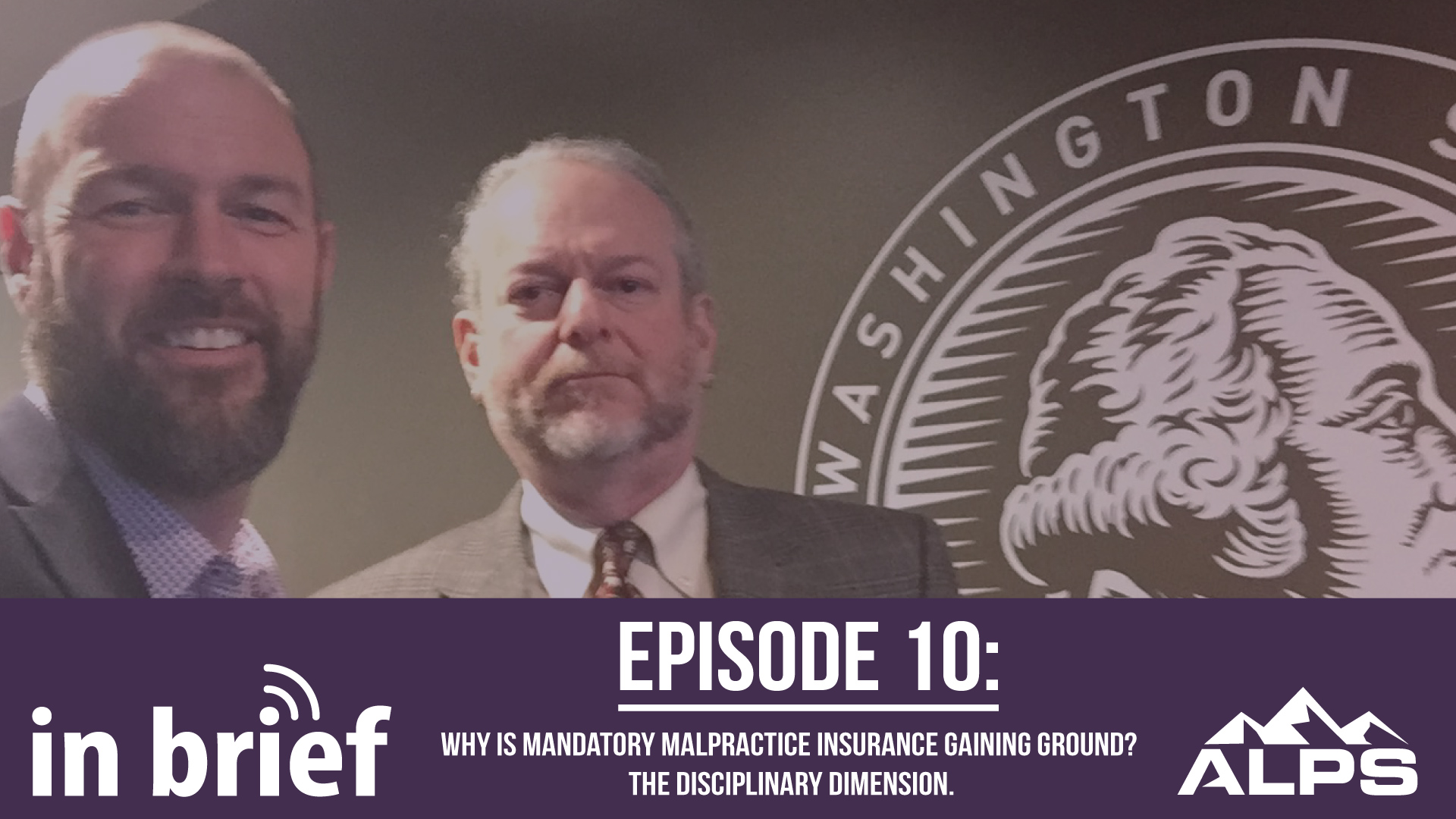
9 min read
ALPS Executive Vice President, Chris Newbold, recently sat down with Doug Ende, the Chief Disciplinary Counsel at the Washington State Bar...
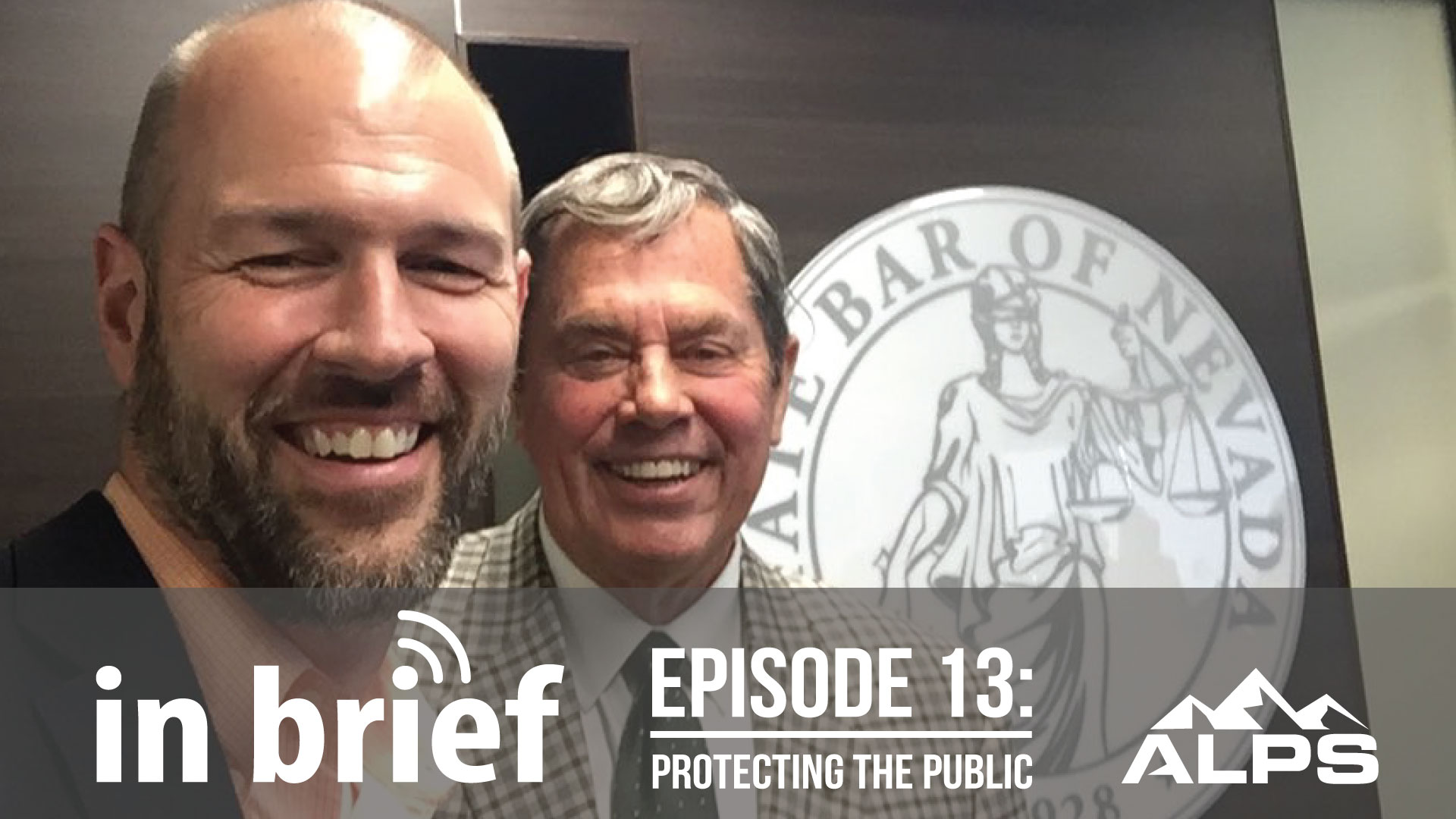
9 min read
While he was facilitating the State Bar of Nevada Strategic Planning, ALPS Executive Vice President Chris Newbold, also had the opportunity to sit...
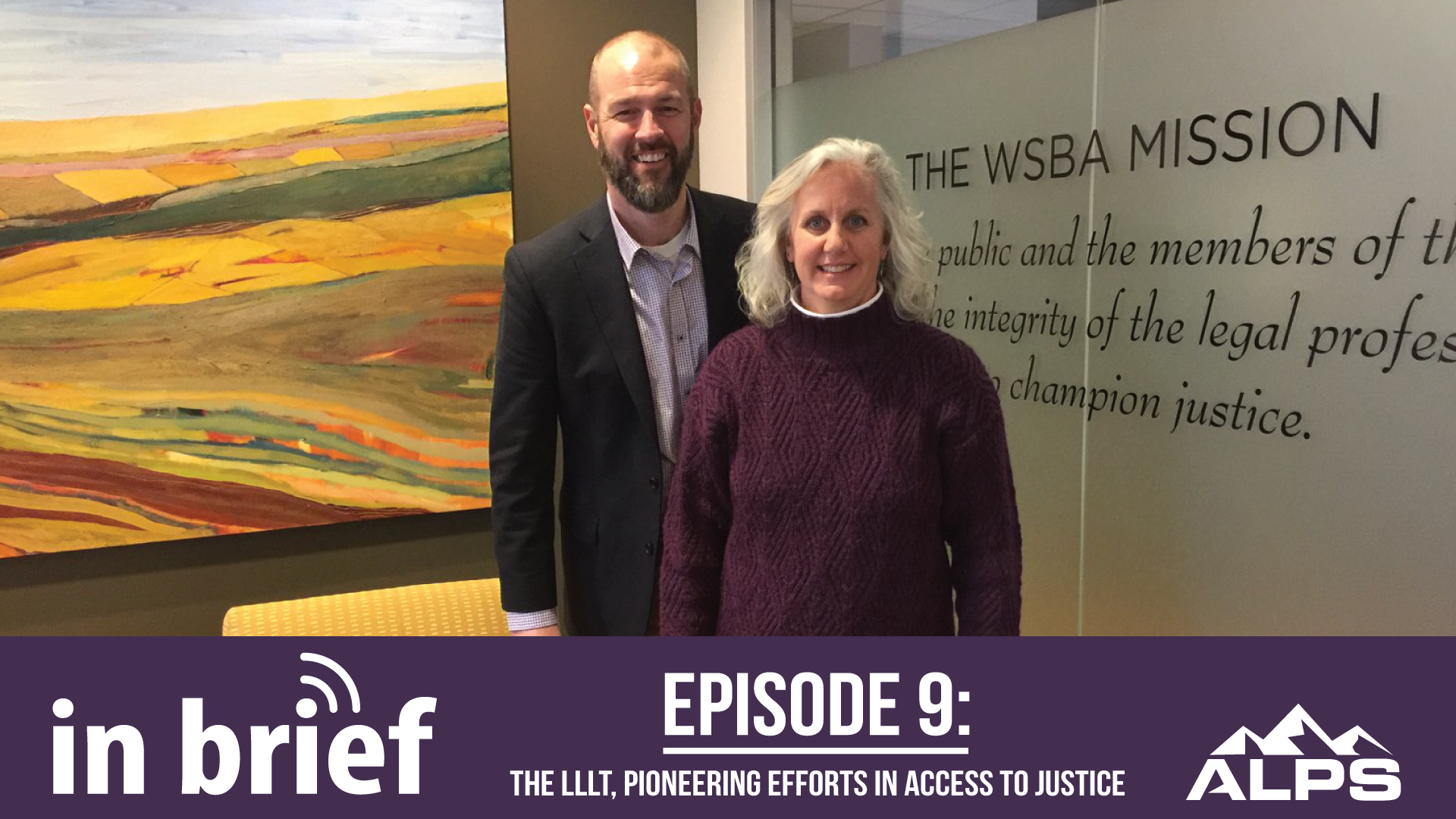
11 min read
Recorded from the Washington State Bar Association offices in Seattle, ALPS Executive Vice President, Chris Newbold, sits down with WSBA Executive...